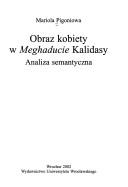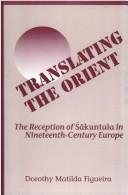| Listing 1 - 10 of 13 | << page >> |
Sort by
|
Book
Year: 1917 Publisher: Paris : E. Champion,
Abstract | Keywords | Export | Availability | Bookmark
 Loading...
Loading...Choose an application
- Reference Manager
- EndNote
- RefWorks (Direct export to RefWorks)
Book
ISBN: 8125044191 9788125044192 Year: 2011 Publisher: Hyderabad: Orient Blackswan,
Abstract | Keywords | Export | Availability | Bookmark
 Loading...
Loading...Choose an application
- Reference Manager
- EndNote
- RefWorks (Direct export to RefWorks)
Kālidāsa’s Abhijñānaśākuntalam has an iconic status in the history of Indian literatures. It is a tale of love found, forgotten and restored between Duṣyanta, the hero king, and Śākuntalā, an innocent maiden. Bringing together linguists, literary critics, historians, Indologists and Sanskritists, Revisiting Abhijñānaśākuntalam analyses the play as more than just a figment of imagination—as a rich terrain for exploring links between culture, history and politics, as an interplay of memory, desire and languages. Divided into three sections, it focuses on the continuity as well as the change in the narrative of Śākuntalā, locating it in contexts of class, caste, gender, patriarchy and monarchy. The first section, ‘The Biography of a Narrative’, addresses the earliest appearance of the narrative in the epic Mahābhārata, its best known form Abhijñānaśākuntalam as nāÔaka, and William Jones’ Orientalist interpretation of the play. It also critically examines the varied representations of the play in diverse forms such as art, theatre and cinema. Contrary to popular perception today that Śākuntalā is the central protagonist of Abhijñānaśākuntalam, the second section, ‘The Hero King’, addresses how and why Duṣyanta is posited as the hero. It examines the representation of the king as the ideal in literature and its material reality in the context of the Gupta Period, the construction of kingship in different genres, and the politics of a courtly culture and patronage within which the articulation of the heroic king takes place. The control of the womb is central to the reproduction of feudal and caste patriarchies. The third section, ‘Of Love, Marriage and Family’, deconstructs the politics of romantic love, marriage and motherhood in the play. The strategies of surveillance, regulation and control of sexuality by state and society as deployed in it are the focus of this section. The book thus looks into how the transactions within the play, whether dealing in love or land, through different languages, mark not only hierarchies of gender, caste and status, but also of spheres of influence and of knowledge. A rich storehouse of diverse perspectives, this volume would be invaluable to students and scholars of literature, culture studies, history, linguistics, and performance studies.
Book
Year: 1980 Volume: 99 Publisher: Salzburg : Institut für Anglistik und Amerikanistik, Universität Salzburg,
Abstract | Keywords | Export | Availability | Bookmark
 Loading...
Loading...Choose an application
- Reference Manager
- EndNote
- RefWorks (Direct export to RefWorks)
Book
ISBN: 9004721746 Year: 2025 Publisher: Leiden, The Netherlands : Koninklijke Brill BV,
Abstract | Keywords | Export | Availability | Bookmark
 Loading...
Loading...Choose an application
- Reference Manager
- EndNote
- RefWorks (Direct export to RefWorks)
For more than a millennium, Kālidāsa’s poem “Lineage of the Raghus” ( Raghuvaṃśa ) has been acknowledged as one of the masterpieces of Sanskrit literature. Thousands of manuscripts transmit it, and dozens of pre-modern commentaries expound the text. This is the second volume (out of three) of the earliest surviving commentary, that of the tenth-century Kashmirian Vallabhadeva. The text that he had before him of Kālidāsa’s poems differs in many places from that printed in other editions, which generally follow the readings of the commentator Mallinātha, who wrote four centuries later. Notes discuss the text and report the readings of three other hitherto unpublished commentaries that predate Mallinātha, namely those of Śrīnātha, Vaidyaśrīgarbha and Dakṣiṇāvartanātha.
Asian Studies. --- Languages and Linguistics. --- Kālidāsa.
Book
ISBN: 9004646337 Year: 1976 Publisher: Leiden : Brill,
Abstract | Keywords | Export | Availability | Bookmark
 Loading...
Loading...Choose an application
- Reference Manager
- EndNote
- RefWorks (Direct export to RefWorks)
Sanskrit literature --- Sanskrit poetry --- History and criticism. --- History and criticism. --- Kālidāsa.
Book
ISBN: 6075642064 Year: 2020 Publisher: Ciudad de México, México : El Colegio de México,
Abstract | Keywords | Export | Availability | Bookmark
 Loading...
Loading...Choose an application
- Reference Manager
- EndNote
- RefWorks (Direct export to RefWorks)
Erotic poetry, Sanskrit --- Poesía erótica --- History and criticism. --- Historia y crítica. --- Kālidāsa --- Criticism and interpretation.

ISSN: 02396661 ISBN: 8322923406 9788322923405 Year: 2002 Volume: 2446 Publisher: Wrocław Wydawnictwo uniwersytetu Wrocławskiego
Abstract | Keywords | Export | Availability | Bookmark
 Loading...
Loading...Choose an application
- Reference Manager
- EndNote
- RefWorks (Direct export to RefWorks)
Women in literature. --- Women --- Sanskrit language --- Terminology. --- Semantics. --- Terminology --- Semantics --- Kālidāsa --- Language --- -Women --- -Women in literature --- Woman (Christian theology) in literature --- Women in drama --- Women in poetry --- Human females --- Wimmin --- Woman --- Womon --- Womyn --- Females --- Human beings --- Femininity --- Sanscrit language --- Indo-Aryan languages --- Manipravalam language (Malayalam) --- Vedic language --- Kalidasa --- -Kalidas --- Galidasa --- Kaalidaasa --- Gaalidaas --- Cálidása --- Kāḷitācan̲ --- Каледас --- Kaledas --- Nag-moʼi-khol --- Nag-mo-kho --- Kāḷitācar --- Mahakavi Kalidas --- Makākavi Kāḷitācan̲ --- Jialituosha --- كالى داس --- کالى داس --- カーリ=ダーサ --- -Language --- Women in literature --- Kālidāsa. --- Kalidas --- Language. --- Women - Terminology. --- Sanskrit language - Semantics. --- Women - Terminology --- Sanskrit language - Semantics --- Kālidāsa - Meghadūta --- Kālidāsa - Language
Book
Year: 1881 Publisher: Paris : Calmann-Lévy,
Abstract | Keywords | Export | Availability | Bookmark
 Loading...
Loading...Choose an application
- Reference Manager
- EndNote
- RefWorks (Direct export to RefWorks)
Greek drama --- French drama --- Théâtre grec --- Théâtre français --- History and criticism --- History and criticism --- Histoire et critique --- Histoire et critique --- Shakespeare, William, --- Kālidāsa --- Criticism and interpretation.
Book
ISBN: 1785273213 1785273205 Year: 2020 Publisher: London : Anthem Press,
Abstract | Keywords | Export | Availability | Bookmark
 Loading...
Loading...Choose an application
- Reference Manager
- EndNote
- RefWorks (Direct export to RefWorks)
As an ancient Indian poet-dramatist, Kālidāsa cannot be absorbed into the homogenizing tendencies of Hindu hagiography, as has often been attempted, especially in the period after independence. Kālidāsa is critiqued for a patriarchal and casteist outlook. These various readings have privileged personal theories and validated them by reading literary texts in certain ways. This book brings together scholars from both sides of the globe who offer possibilities for reviewing this text, not as an Oriental discovery or a cultural property, but as an ancient literary text that can be read in multiple philosophical contexts. Further, the translations of AbhijñānaŚākuntalam into South Asian languages like Urdu and Nepali, and a classical language like Persian, are also included for detailed study for understanding the impact of this text in the respective literary traditions of these languages, and to assess the actual cross-literary dialogue that this text made, without hyperboles and generalizations, given the fact that many of these translation happened just before and after independence when literary historiography and nation writing project went hand in hand in India.
Memory in literature. --- Memory as a theme in literature --- Sanskrit drama --- Mysticism in literature. --- Metaphor in literature. --- History and criticism. --- Kālidāsa. --- Kālidāsa --- Criticism and interpretation. --- Kalidas --- Galidasa --- Kaalidaasa --- Gaalidaas --- Cálidása --- Kāḷitācan̲ --- Каледас --- Kaledas --- Nag-moʼi-khol --- Nag-mo-kho --- Kāḷitācar --- Mahakavi Kalidas --- Makākavi Kāḷitācan̲ --- Jialituosha --- كالى داس --- کالى داس --- カーリ=ダーサ

ISBN: 0791403289 0791403270 Year: 1991 Publisher: Albany : State University of New York Press,
Abstract | Keywords | Export | Availability | Bookmark
 Loading...
Loading...Choose an application
- Reference Manager
- EndNote
- RefWorks (Direct export to RefWorks)
Comparative literature --- European literature --- Indic literature --- Philosophy, Indic, in literature. --- Sanskrit language --- European and Indic. --- Indic and European. --- History and criticism. --- Style. --- Littérature européenne --- Littérature de l'Inde --- Philosophie de l'Inde dans la littérature --- Histoire et critique --- Kālidāsa. --- India --- Inde dans la littérature --- In literature.
| Listing 1 - 10 of 13 | << page >> |
Sort by
|

 Search
Search Feedback
Feedback About UniCat
About UniCat  Help
Help News
News